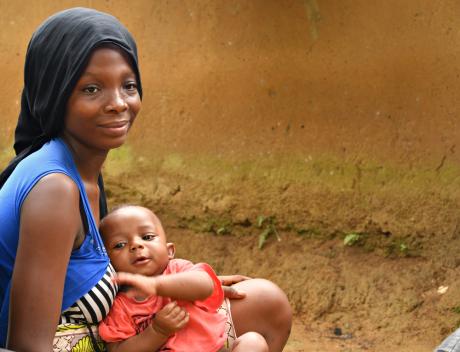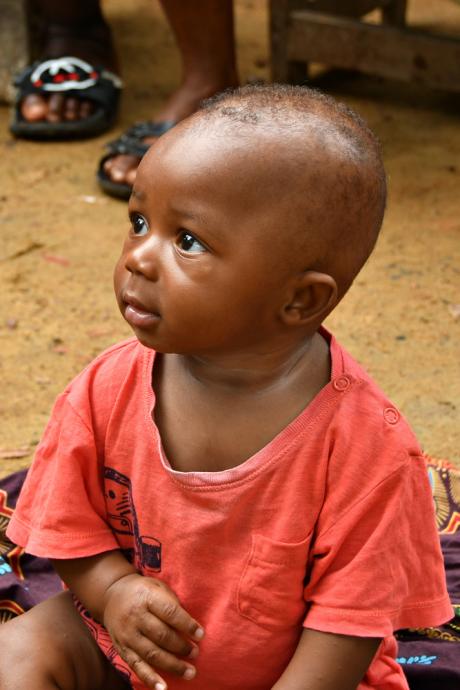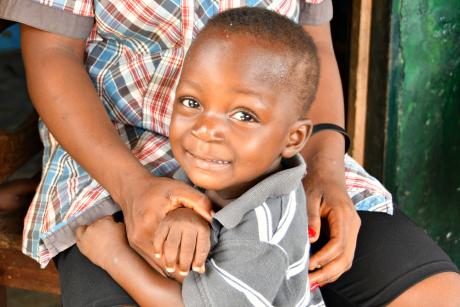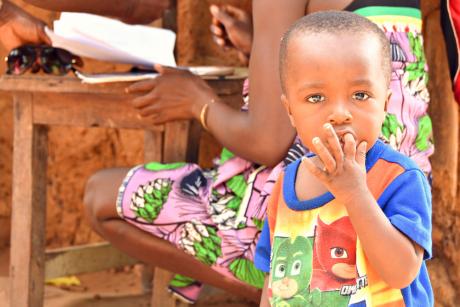The lives of three baby boys were saved as a result of the partnership between Partners in Health and MAF
By the time baby Cousubah was seen at hospital his situation was grave. An accident at home had left him with a serious injury to the chest. When his mother Gertrude took him to Pleebo Health Centre, just outside Harper in south-east Liberia, staff recognised the danger he was in. They immediately referred him to the J. J. Dossen hospital in Harper.

The decision was made that Cousubah needed transfer to the capital, Monrovia, for surgery. Thanks to the partnership between Partners in Health (PIH) and MAF, seats were made available on the plane; Cousubah and Gertrude could go straight away. ‘The situation was desperate,’ explains referral nurse Julius Kpoeh, responsible for managing transfers and supporting the patients through the process. ‘If they had gone on the road, he might not have even made it to Monrovia.’
MAF helps us do the 'whatever it takes'.
A good outcome
Following successful treatment, Cousubah and his mother flew back a month later, the now-thriving little boy a wonderful example of a story that ended well. Viola Karanja, Deputy Executive Director of PIH, expresses the encouragement such events are to staff: ‘When they come back and you see that something was done, and they are well, it’s really a joy. It's really a joy just seeing the patient going back home.’
Executive Director Dr Maxo Luma echoes these sentiments. ‘It is a reward for me as a physician every time a patient walks out of hospital.’ In a country where the health care system was brought to its knees by the Ebola crisis in 2014/15, such outcomes can never be taken for granted, which is why the collaboration between MAF and PIH is so important.

Life-saving flights
It's not the first success story from this successful collaboration.
New mother Faith was worried by baby Alivn’s constant sickness, and so took him to be seen at the J.J.Dossen Hospital. Diagnosed with an obstructed bowel, the one-month old needed surgery, for which he had to go to Monrovia. After an anxious two-day wait, a seat was available on an MAF flight and they departed. Faith’s mother, who takes care of the family, watched them go with fear and uncertainty. ‘I asked God to be with them,’ she says. And how did she feel when they returned? She breaks into a smile. ‘I was so happy to see Faith holding the baby. I said thank you God.’
Faith and her family know that without the plane, Alivn would not have survived; he could not have gone by road to Monrovia. ‘At times the southeast of Liberia is cut off completely,' explains Viola, 'especially during the rainy season. So that's one of the biggest challenges, when you have a patient and you have to get them out. You can't move them by road, so the only alternative is MAF.’

They've never told us ‘no’.
Daddyboy was three months old when he was diagnosed with iliac atresia, a problem of the digestive system with serious consequences if left untreated. Again, the situation was desperate and timing was critical. Again, space was found on a flight. ‘MAF always gives priority to our patients, the emergency patients,’ says Viola. ‘They've never told us ‘no’, even when it’s very last-minute.’
PIH shares that priority: it is not unusual for staff to give up their own seats so that patients can fly. For Dr Luma, these coinciding values are one of the reasons the partnership is so effective. ‘We as PIH, we say we will do whatever it takes; I think MAF basically helps us do the 'whatever it takes'. With MAF, there is always a way.’

Without the plane he would have died.
Changing the Ending
Daddyboy and his mother Benetta had to make two journeys to Monrovia, the first time accompanied by nurse Julius as the baby was so seriously ill. Surgeons fitted a colostomy, and they returned home for three months, a situation that required careful handling. Fearful of the stigma of Daddyboy’s illness, of people in the community saying that her baby was ‘not right’, Benetta wanted to stay at the hospital in Harper for the whole time between operations. But staff persuaded her that she had the capability to look after the child at home; by carefully following the instructions she was given, she surpassed even her own expectations, and Daddyboy suffered no infection or health issues during that time.
The second trip was for revision and closure of the colostomy; in the 18 months that have since elapsed, mother and son have been happily at home with their extended family. Although she was terrified the first time she flew - ‘She grabbed me round the neck and almost took my shirt off my body!’ exclaims Julius - Benetta appreciates what MAF does, and how the plane can help people. She is in no doubt that without the plane, her baby would have died.
Shared values
MAF’s partnership with PIH extends beyond the movement of patients and staff to the transportation of drugs, medical equipment, and any other items that might be needed; nonetheless, reaching the isolated remains at the heart of it.
Dr Luma sums it up. ‘I can see the commonality between what MAF believes in and what PIH believes in: we are both people-centred; we really want to serve. So that's where we meet.’